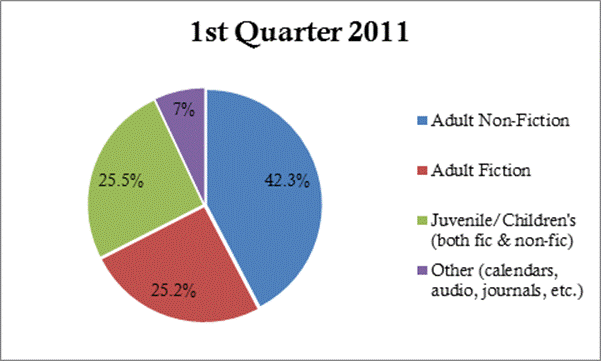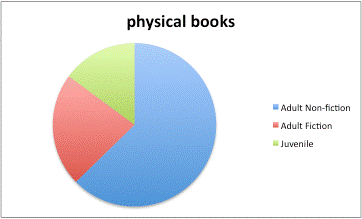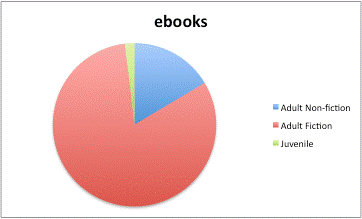|
One of the ongoing conversations at Book Expo America this year was the growth of ebooks. How fast is the market transforming? Is it cannibalizing the print book market? If so, which part? Or is it expanding readership? And all of the potential ramifications and implications of these questions. I heard people say things like, “yes, ebooks are only a small percent of total book sales now, but you can see how they’re going to be 60% or 70% of the market in a few years.” And I thought to myself, “Really?” The “book industry” is not just one industry; books are purchased by different types of users and for different reasons. So it stands to reason that different parts of the market will transform at different speeds. What currently sells in physical books When you break out broad categories of physical books sold in 1st quarter 2011 (data from Bookscan), here’s what you see: So the single largest category of physical books sold is adult non-fiction which makes up 42% of that market. What’s selling in ebooks On the other hand, when you look at what’s selling in ebooks, it’s primarily narrative. The only real data I can cite here are our own figures and the ebook bestsellers lists from individual e-tailers, which are dominated by fiction (the NY Times e-bestsellers separate fiction and non-fiction, but you can’t infer comparative volumes). For example
These counts were taken at one point in time last week and these lists change hourly. I checked back 3 other times and the results were roughly the same (under 20% of the bestselling titles). This is pretty much in line with what’s being reported by publishers. Here is a chart of Sourcebooks’ unit sales for physical books and the same for ebooks: So while the majority of our physical book sales are in adult non-fiction, the majority of our ebook sales are in adult fiction. So what’s missing in this picture? Right now we’re seeing relatively weak conversion of adult non-fiction to ebooks. While this category of physical books has declined a bit in the last few years (down 1.1% in Q1 2011, per Bookscan), as noted above, it’s still 42% of the print book business. Again via Bookscan, here were the 5 largest categories of adult non-fiction for Q1 2011: Reference is the biggest category of non-fiction and our experience at Sourcebooks is that reference is also the hardest category to get right in ebooks. At Sourcebooks, reference is highly formatted: lots of subsections, sidebars, pictures, diagrams, pull-quotes, etc. It’s highly “browseable,” “dippable,” not necessarily a linear reading experience. All the things that we put in to make the book more experiential as a printed book are the very things that are harder to replicate as an experience in an ebook. And there are so many different kinds of reference books.
The other difficult transformation area right now is children’s books (as distinct from young adult books). E-tailers’ bestsellers lists, publisher-reported data, and our own data are not suggesting strong conversion to ebooks yet for juvenile books, outside of cross-over YA (e.g., The Hunger Games and Twilight). The importance of narrative Stories seem to be at the heart of ebooks right now. Even the successful non-fiction ebooks we’re seeing skew to narrative - memoirs and biography and history. They’re all stories – and they’re all linear reading experiences. Are apps the future of adult non-fiction and/or children’s books? One of the interesting questions being asked today is what can digital look like for illustrated children’s books and reference products? It’s one of the things we’ve been thinking about a lot at Sourcebooks. Although it is still early days, I am inclined to believe that we are likely to make real progress with apps and websites. For example, you can look at the Books bestsellers list on Apple’s App Store and see a lot of illustrated children’s books. That thinking is also why we decided to turn the #1 bestselling Fiske Guide to Colleges into the iPad app Fiske Interactive College Guide. And it’s at the heart of the development work that we’re now doing with our authors and other partners. What do you think? Feel free to jot your ideas in the comments. As always, looking forward to the conversation. Dominique |
Welcome to the Sourcebooks Books and Buzz Blog!
Click a category below, search for a specific author, book, or topic. Categories for each of our imprints are as follows: Categories
All
Archives
April 2020
|
About |
Authors |
© COPYRIGHT 2024. ALL RIGHTS RESERVED.





 RSS Feed
RSS Feed




